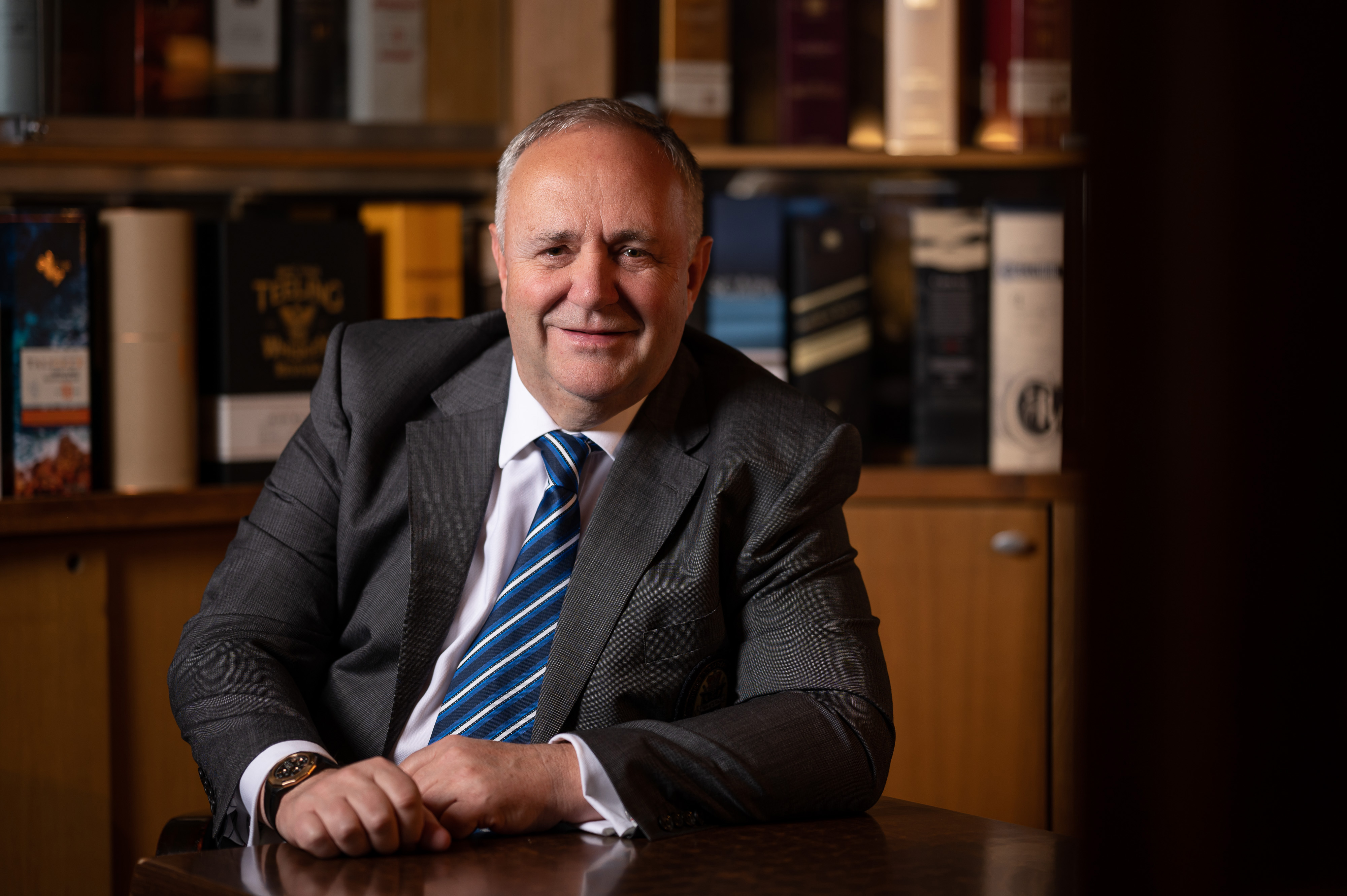Rejuvenating the Crème de la Crème of Hungarian Cosmetics
Péter Budaházy
In 2004, a consortium of entrepreneurs took over Helia-D, a renowned Magyar cosmetics brand in the 1980s but then on the point of extinction. The consortium set out to change that.
Péter Budaházy seems a modest, easy-going guy: he is prepared to pick up visiting journalists from the local rail station in his car, and walking around the shop floor of his production facilities in Veszprém, 120 km southwest of Budapest, he greets all the “associates” he meets with a “te,” the informal form of “you” in Hungarian.
But as managing director and owner of Helia-D, Hungary’s home-grown cosmetics company, he is anything but lax on vital issues: Such is the emphasis on hygiene that everyone washes hands and dons protective laboratory coats, shoe, and hair covers before entering the clean production areas of the plant. Once inside, Budaházy points to tanks and mixing units costing up to EUR 400,000 apiece.
“The active ingredients typically only make up between 0.1 and 2% [of the cosmetic], but we use only the highest quality. One, Copper Tripeptide-1, is more expensive than gold,” he says.
This is all a far cry from the Csepel Island village, south of Budapest, where, in the 1970s, Mrs. Jenő Nedeczky, an English teacher, started to produce her own cosmetic creams based on sunflower stem extract from her home.
Starved of good quality cosmetic products at the time, as word got around, the public queued up outside to sample her “miracle” wares. Before long, the phenomenon attracted media attention, which in turn alerted professionals in the sector.
By 1982, after careful testing in the laboratory, Biogal, a state-owned pharmaceutical company, began industrial production of her preparations under the brand name Helia-D, most unusually in black glass jars.
“These were good quality products, using plant-based ingredients, and had, I think, nine different patents altogether, because there was the sunflower stem extract, maize leaf extract, Tokaj aszú extract [and others]. It became a success story in Hungary and abroad. In the United States, Zsa Zsa Gabor [the Hollywood actress born in Hungary] was using it,” Budaházy relates enthusiastically.
But with the collapse of the Socialist system and subsequent privatizations of the 1990s, Helia-D, passing between different owners, became something of an orphan in the high-pressure world of the free-market. By 2004, when Budaházy learned it was up for sale, its product portfolio had shrunk from a peak of 150 items to just four.
Good Revenues
Yet, even this much-diminished operation was, surprisingly, still generating good revenues. Budaházy, a former investment banker now trying his hand as a freelance venture capitalist, had an eye for the future potential and, with a group of like-minded friends, made a bid.
“It was a good opportunity and not very expensive,” he says of the transaction.
(Budaházy declines to reveal details of the deal today, but the Menedzsment Fórum (Management Forum) website mfor.hu states that the consortium paid U.K.-based multinational Unilever “a few hundred million forints” for the brand.)
Seeking to revive the company’s fortunes was no simple task, however, especially since Budaházy lacked any specialist knowledge of the sector.
“At the beginning, I had a partner who was already in the cosmetic business, so that’s why I didn’t manage the company for the first five years. I was looking at it from a distance,” he admits.
After hiring a managing director and an assistant, the new team set out to rejuvenate the company, moving production to Veszprém and launching 5 new products within the first year.
“As we learned the business, it became obvious that the key [to success] was product development. You have to keep developing new, competitive, good quality products,” Budaházy argues.
As part of this philosophy, Helia-D worked to develop its older, classic range, in many cases upgrading with natural rather than unnatural ingredients in the original formulae.
This means, for example, that traditional vaseline, a petroleum product, has been dropped in favor of a plant-based version.
Today, as a result of this policy, most Helia-D products can carry the Vegan stamp of approval.
Slowly but surely, the former investment banker bought out his partners and, with his vastly improved knowledge of the sector, took over as managing director in 2009.
Model Endorsement
A few years later, the company was ready to launch television and other marketing campaigns, signing up Ágnes Pataki, Hungary’s best-known female model in the late 1970s and 1980s in 2019 to promote its anti-aging products. It was a deal Budaházy personally worked hard to seal.
“I convinced her by saying L’Oreal was using Jane Fonda and Helen Mirren [in promotions]. What is very special about Ági is she is 70 now, and she is still beautiful,” he says.
Today, the Helia-D range comprises more than 200 individual products. The company also produces a variety of sub-brands, including Helia-D Professional for beauty salons and cosmeticians and Officina, a separate brand for sales in pharmacies. (Cosmetic companies typically have a different brand for over-the-counter pharmacy purchases.) Total sales amounted to HUF 2.2 billion in 2001.
In parallel with these developments, Budaházy expanded into other domestic cosmetic companies, most notably with the purchase of the original production premises in Veszprem after its British-Dutch owners went into administration in the 2008-09 economic crisis.
Now dubbed PL Beauty Cosmetics, it focuses mainly on contract orders, with 95% of production, worth some HUF 4.5 billion, destined for foreign markets. (Most of the Helia-D range is today produced in a smaller, separate unit in Veszprém.)
Today, all told, Budaházy’s cosmetic companies employ some 240 people, a spectacular advance on the skeleton operation his consortium took over in 2004.
However, one target set at that time has proved elusive. According to the mfor.hu article, the new owners were hoping to garner some 20-30% of Helia-D revenues from exports by 2005. In reality, as of last year exports constituted a mere 5% of sales.
With intense competition from strong global brands and local operations, foreign sales are “only growing slowly,” Budaházy acknowledges.
“We were quite successful in Russia, we have had some success in the U.S., and we are making some first sales in Taiwan, Azerbaijan and Albania,” he says. “We have to be even more competitive. [….] The quality is there, and our designs are good for the Hungarian market, but perhaps we need something a little bit different for other markets.”
The Origin of the Brand Name Helia-D
Helia-D is a somewhat odd brand name, but there’s a simple tale behind its origin. It’s one Krisztina Somogyi, who runs the “Herbal House” in Tolcsva, a village 240 km northeast of Budapest, tells several times a day in summer.
The facility, a kind of “hands-on” cosmetic kitchen-cum museum, was established by Péter Budaházy for guests to enjoy an introduction to cosmetics and create their own skin creams. It is proving a popular alternative tourist attraction to the many wineries in the surrounding Tokaj wine region.
“Helia-D first started production at the Biogal plant, in the city of Debrecen, near here, 40 years ago, and the first product was based on sunflower stem extract,” she says.
“So the ‘D’ in the name comes from the location, the first letter of Debrecen, and Helia refers to the sunflower, because its scientific name is Helianthus annuus, itself from Helios, the god of sun.”
This article was first published in the Budapest Business Journal print issue of July 15, 2022.
SUPPORT THE BUDAPEST BUSINESS JOURNAL
Producing journalism that is worthy of the name is a costly business. For 27 years, the publishers, editors and reporters of the Budapest Business Journal have striven to bring you business news that works, information that you can trust, that is factual, accurate and presented without fear or favor.
Newspaper organizations across the globe have struggled to find a business model that allows them to continue to excel, without compromising their ability to perform. Most recently, some have experimented with the idea of involving their most important stakeholders, their readers.
We would like to offer that same opportunity to our readers. We would like to invite you to help us deliver the quality business journalism you require. Hit our Support the BBJ button and you can choose the how much and how often you send us your contributions.







